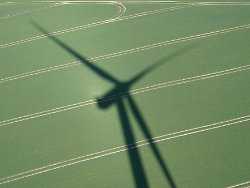Through the government’s energy transition
Allianz Trade expects job boom
5/5/2022, 3:01 p.m
The credit insurer Allianz Trade is confident: Minister of Economics Habeck’s Easter package will create hundreds of thousands of new jobs. “For the economy, it should have a medium-term turbo effect and boost economic growth,” says an economist.
According to estimates by the credit insurer Allianz Trade, the energy transition pushed by the new federal government could create more than 400,000 new jobs by 2032. As an introduction to the accelerated expansion of renewable energies, the cabinet passed the so-called Easter package from Economics and Climate Protection Minister Robert Habeck at the beginning of April. “The Easter package could become a real job engine,” said economist Katharina Utermöhl, according to the Allianz Trade release in Hamburg. “It should also act as a turbo for the economy in the medium term and boost economic growth.”
However, the economist also spoke of ambitious plans, for the realization of which many hurdles would have to be overcome. She mentioned bureaucratic obstacles, rapid price increases, supply chain disruptions, scarce raw materials and labor shortages. “In addition, the package requires corresponding investments from the private sector. If this succeeds, it will be a turning point on the way to a sustainable economy.”
A recent survey by Allianz Trade (formerly Euler Hermes) revealed that the issue of sustainability has so far only played a minor role for many export companies. “The ambitious plans and the associated potential could also cause companies to rethink, prioritize the issue of sustainability more strongly and sharpen their sustainability strategies.”
Ambitious goals by 2035
Habeck’s Easter package, which marks the starting point for the accelerated green transformation of the German economy, includes a huge catalog of projects for the expansion of wind and solar energy and the corresponding infrastructure. By 2030, 80 percent of electricity should come from renewable sources, and by 2035 it should be almost 100 percent.
The Allianz Trade economists consider the goal to be realistic: “Motivated by the phasing out of Russian fossil fuels, the transformation of the electricity sector should be achieved as early as 2035.” The expansion targets for wind energy at sea and on land have been significantly increased compared to the plans of the previous government, the construction of wind turbines and solar systems is to be considered “in the overriding public interest” in the future. If the plans succeed, the Allianz Trade economists believe Germany is capable of “playing a pioneering role within Europe.”
